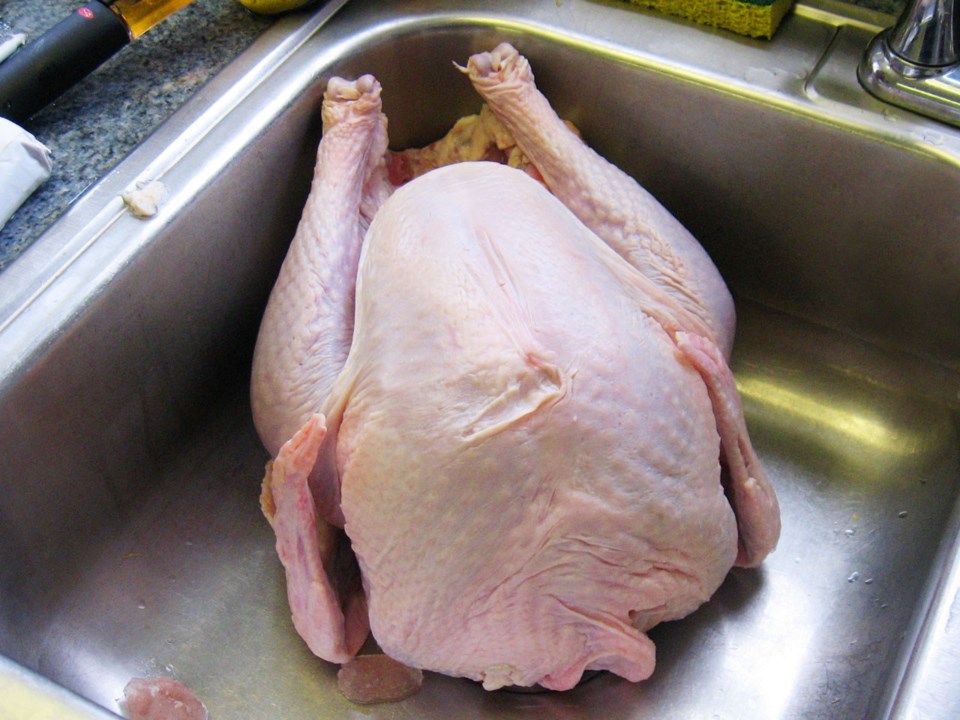OTTAWA — The Public Health Agency of Canada is continuing to investigate a longstanding salmonella outbreak that has now affected at least 126 people across the country.
Eight of the cases occurred in Ontario.
Thirty-eight individuals have been hospitalized since April 2017, and one person has died.
Investigators have identified exposure to raw turkey and raw chicken products as the likely source of the outbreak.
The Public Health Agency is not advising consumers to avoid eating properly cooked turkey or chicken, nor is it advising retailers to stop selling raw poultry.
No food recall warnings have been issued.
However, the agency said Wednesday it was issuing a public notice because the outbreak is ongoing, with 16 illnesses reported recently.
Salmonella bacteria are commonly found in raw or undercooked poultry.
The United States Centers for Disease Control and Prevention previously investigated similar salmonella illnesses in several states that were linked to raw turkey exposure.
Some turkey products associated with that outbreak were recalled, but none of the products were distributed in canada.
The U.S. investigation concluded in April 2019.
The Public Health Agency said consumers should be aware of the importance of using safe food handling practices.
Raw poultry contaminated by salmonella may look, smell and taste normal.
Health Canada / Food Safety Tips
- Always wash your hands before and after you touch raw turkey and raw chicken. Wash with soap and warm water for at least 20 seconds. Use an alcohol-based hand rub if soap and water are not available.
- Always cook turkey and chicken products to a safe internal temperature that has been checked using a digital thermometer.
- Turkey and chicken breasts, as well as ground poultry, including turkey and chicken burgers, should always be cooked to an internal temperature of 74°C (165°F) to kill any harmful bacteria. Whole turkey and chicken should be cooked to an internal temperature of 82°C (180°F).
- Leftovers should be reheated to 74°C (165°F). Use a digital food thermometer to check, and place it in the thickest part of the food.
- Thaw frozen raw turkey and raw chicken in the fridge. Thawing raw turkey and raw chicken at room temperature can allow bacteria to grow.
- Never rinse raw turkey or raw chicken before cooking it because the bacteria can spread wherever the water splashes.
- Use a separate plate, cutting board, utensils and kitchen tools when preparing raw turkey and raw chicken.
- Clean everything that has come in contact with raw turkey or raw chicken with a kitchen cleaner or bleach solution and then rinse with water.
- Kitchen cleaner (follow the instructions on the container)
- Bleach solution (5 mL household bleach to 750 mL of water)
- Keep raw turkey and raw chicken away from other food while shopping, storing, repackaging, cooking and serving foods.
- If you have been diagnosed with a Salmonella infection or any other gastrointestinal illness, do not cook food for other people.
- Do not feed raw ground turkey or raw ground chicken to your pets. Bacteria like Salmonella in raw pet food can make your pets sick. Your family also can get sick by handling the raw food or by taking care of your pet.
Salmonella Symptoms
Symptoms of a salmonella infection, called salmonellosis, typically start 6 to 72 hours after exposure to salmonella bacteria from an infected animal or contaminated product.
Symptoms include:
- fever
- chills
- diarrhea
- abdominal cramps
- headache
- nausea
- vomiting
These symptoms usually last for four to seven days. In healthy people, salmonellosis often clears up without treatment. In some cases, severe illness and hospitalization may occur. In some cases, antibiotics may be required. People who are infected with Salmonella bacteria can be infectious from several days to several weeks. People who experience symptoms, or who have underlying medical conditions, should contact their health care provider if they suspect they have a salmonella infection.
